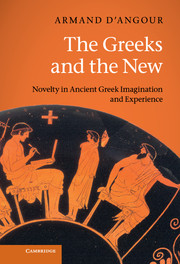Book contents
- Frontmatter
- Contents
- Acknowledgements
- Introduction
- Chapter 1 New, new, new
- Chapter 2 Loosening the grip of the past
- Chapter 3 The transformations of Kaineus
- Chapter 4 Old and new
- Chapter 5 Nothing new under the sun
- Chapter 6 The birth of Athena
- Chapter 7 Inventions of Eris
- Chapter 8 The newest song
- Chapter 9 Constructions of novelty
- Chapter 10 So what's new?
- References
- General index
- Index of Greek terms
- Index locorum
- References
Chapter 6 - The birth of Athena
Published online by Cambridge University Press: 07 September 2011
- Frontmatter
- Contents
- Acknowledgements
- Introduction
- Chapter 1 New, new, new
- Chapter 2 Loosening the grip of the past
- Chapter 3 The transformations of Kaineus
- Chapter 4 Old and new
- Chapter 5 Nothing new under the sun
- Chapter 6 The birth of Athena
- Chapter 7 Inventions of Eris
- Chapter 8 The newest song
- Chapter 9 Constructions of novelty
- Chapter 10 So what's new?
- References
- General index
- Index of Greek terms
- Index locorum
- References
Summary
All wonder is the effect of novelty upon ignorance.
Samuel JohnsonBirth, wonder, light: the Greeks persistently associate these notions (and related images and narratives) with novelty. Ideas of origination are regularly accompanied by images of light, and both birth and light evoke responses of wonder and bedazzlement. Birth, the moment at which a new life is seen to begin, the visible entry into a world of change, is at the heart of a host of images of novelty; it is a frequent metaphor for origins and coming-to-be, natural or otherwise. Subjects both animate and inanimate, real and imaginary, young creatures and manufactured products, emerge into existence through the process of genesis. The notion gives central expression to the symbolic representation of the new in philosophical, historical and religious contexts; forms of gignesthai (to become, to be born) abound in writings that deal with origins and beginnings. In Greek poetry and prose, birth is equated with coming into the light (es phaos). That light is virtually synonymous with life: it is both a starting-point for new events, and a marker of continuity with old ones. Euripides’ tragedy Danae begins with the heroine's father connecting the beauty of sunlight with the ‘bright’ birth of children:
My wife, this light (pheggos) of the sun is beautiful – just as it is beautiful to behold the sea when calm, the earth flowering in spring, the water teeming with riches – and I can tell the praise of many beautiful things: but nothing is so brilliant (lampron) or beautiful to behold, for the childless and those bitten by longing, as the light (phaos) of newborn children.
In due season, departure from the light will constitute death, a passing back to the dark and the unknown. Only initiates of the Mysteries, ‘knowing’ ones (eidotes) enlightened with a vision of life beyond death, may hope to enjoy the prospect of renewed access to light.
- Type
- Chapter
- Information
- The Greeks and the NewNovelty in Ancient Greek Imagination and Experience, pp. 134 - 161Publisher: Cambridge University PressPrint publication year: 2011

